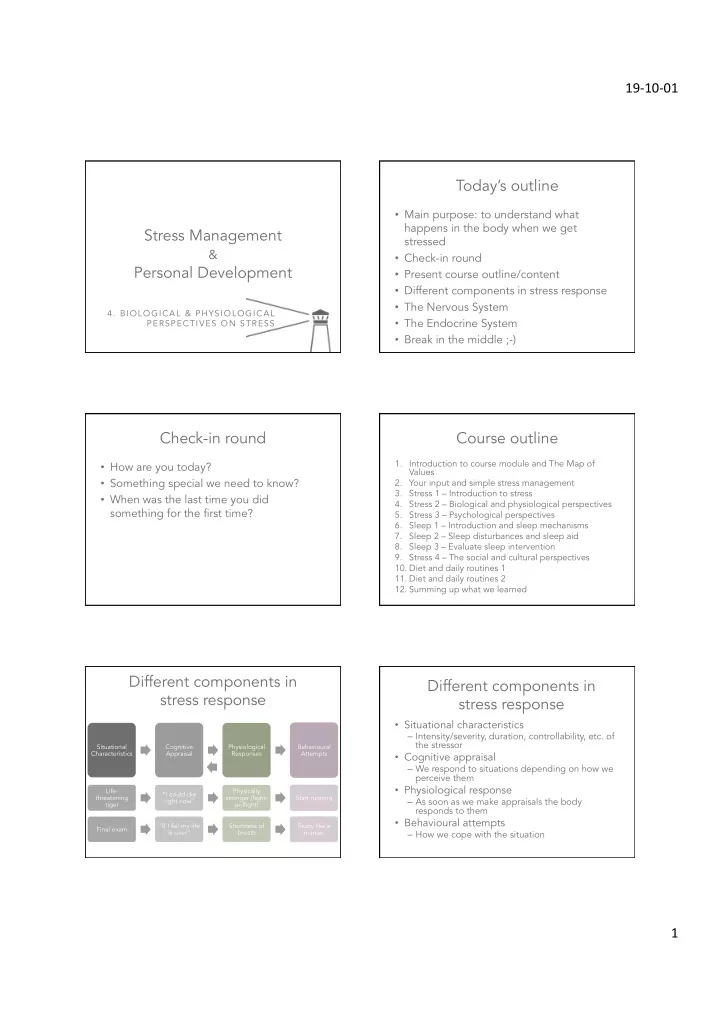

19-‑10-‑01 ¡ Today’s outline • Main purpose: to understand what happens in the body when we get Stress Management stressed & • Check-in round Personal Development • Present course outline/content • Different components in stress response • The Nervous System 4. BIOLOGICAL & PHYSIOLOGICAL • The Endocrine System PERSPECTIVES ON STRESS • Break in the middle ;-) Check-in round Course outline 1. Introduction to course module and The Map of • How are you today? Values • Something special we need to know? 2. Your input and simple stress management 3. Stress 1 – Introduction to stress • When was the last time you did 4. Stress 2 – Biological and physiological perspectives something for the first time? 5. Stress 3 – Psychological perspectives 6. Sleep 1 – Introduction and sleep mechanisms 7. Sleep 2 – Sleep disturbances and sleep aid 8. Sleep 3 – Evaluate sleep intervention 9. Stress 4 – The social and cultural perspectives 10. Diet and daily routines 1 11. Diet and daily routines 2 12. Summing up what we learned Different components in Different components in stress response stress response • Situational characteristics – Intensity/severity, duration, controllability, etc. of the stressor Situational Cognitive Physiological Behavioural Characteristics Appraisal Responses Attempts • Cognitive appraisal – We respond to situations depending on how we perceive them • Physiological response Life- Physically “I could die threatening stronger (fight- Start running – As soon as we make appraisals the body right now” tiger or-flight) responds to them • Behavioural attempts “If I fail my life Shortness of Study like a Final exam is over” breath maniac – How we cope with the situation 1 ¡
19-‑10-‑01 ¡ Biological & Physiological Physiological stress systems perspectives on stress • The Autonomic Nervous System (ANS) • Physiological response to mobilize energy – Sympathetic Nervous System (SNS) – Activates our body • We need our stress systems to survive • HPA axis • Stress is not bad or dangerous – Hypothalamus, Pituitary gland, Adrenal glands – Stress hormones • Positive vs. negative stress • The Immune System • Two main systems involved in stress: – Acute stress enhances – Chronic stress supresses – Sympathetic nervous system • Amygdala – HPA axis (endocrine system à stress – Organizes motivational and emotional response hormones) patterns (fear and aggression) – Signals danger! – Unconscious emotional response Stress in the Nervous System Stress in the Nervous System The Nervous System The Nervous System Central Nervous System Peripheral Nervous System Central Nervous System Peripheral Nervous System (CNS) (PNS) (CNS) (PNS) Brain Spinal Cord Brain Spinal Cord Somatic System Autonomic System Somatic System Autonomic System Sympathetic Parasympathetic Sympathetic Parasympathetic Autonomic Nervous System The Endocrine System • The system of the hormones Parasympathetic Sympathetic • Hormones = chemical messengers Dilates pupils • Numerous hormone-secreting glands: Contracts pupils (enhance vision) Eyes – Hypothalamus Relaxes bronchi – Pituitary Constricts bronchi (increased air to lungs) – Thyroid Lungs – Adrenal Strengthens heart beat Slows heart beat (increased oxygen) – Pancreas Heart – Ovaries (females) Inhibits activity Stimulates activity (blood sent to muscles) – Testes (males) Stomach /intestines • HPA axis for stress response Contracts vessels Dilates vessels • Adrenal à the stress hormones Blood vessels (increased blood pressure) of internal organs 2 ¡
19-‑10-‑01 ¡ The Endocrine System The HPA axis • Stress hormones: • Hypothalamus (CRF/CRH) • Pituitary gland (ACTH) – Adrenalin (epinephrine) • Adrenal gland (cortisol) – Noradrenaline (norepinephrine) – Cortisol • Short-term positive stress • Long-term negative stress • Stress hormones suppress immune system functioning Summary Until next time… • Stress response have several components: • Doing one thing differently per day: – Situational (stressors’ characteristics) – Balance activity with rest – Cognitive (how we perceive situation) – Focus on your main activity – Physiological (body responds, prepares us) – Do something slowly – Behavioural (we act) • Two major stress systems: • Follow-up group contract – SNS (activates; blood, oxygen, vision…) • Don’t forget area 5-8 in the map of values – HPA (secretes stress hormones) (until next Thursday) • Stress response, an awesome system for survival! • Positive, short-term stress is okay • See you Thursday! • Negative, long-term stress à disease 3 ¡
Recommend
More recommend